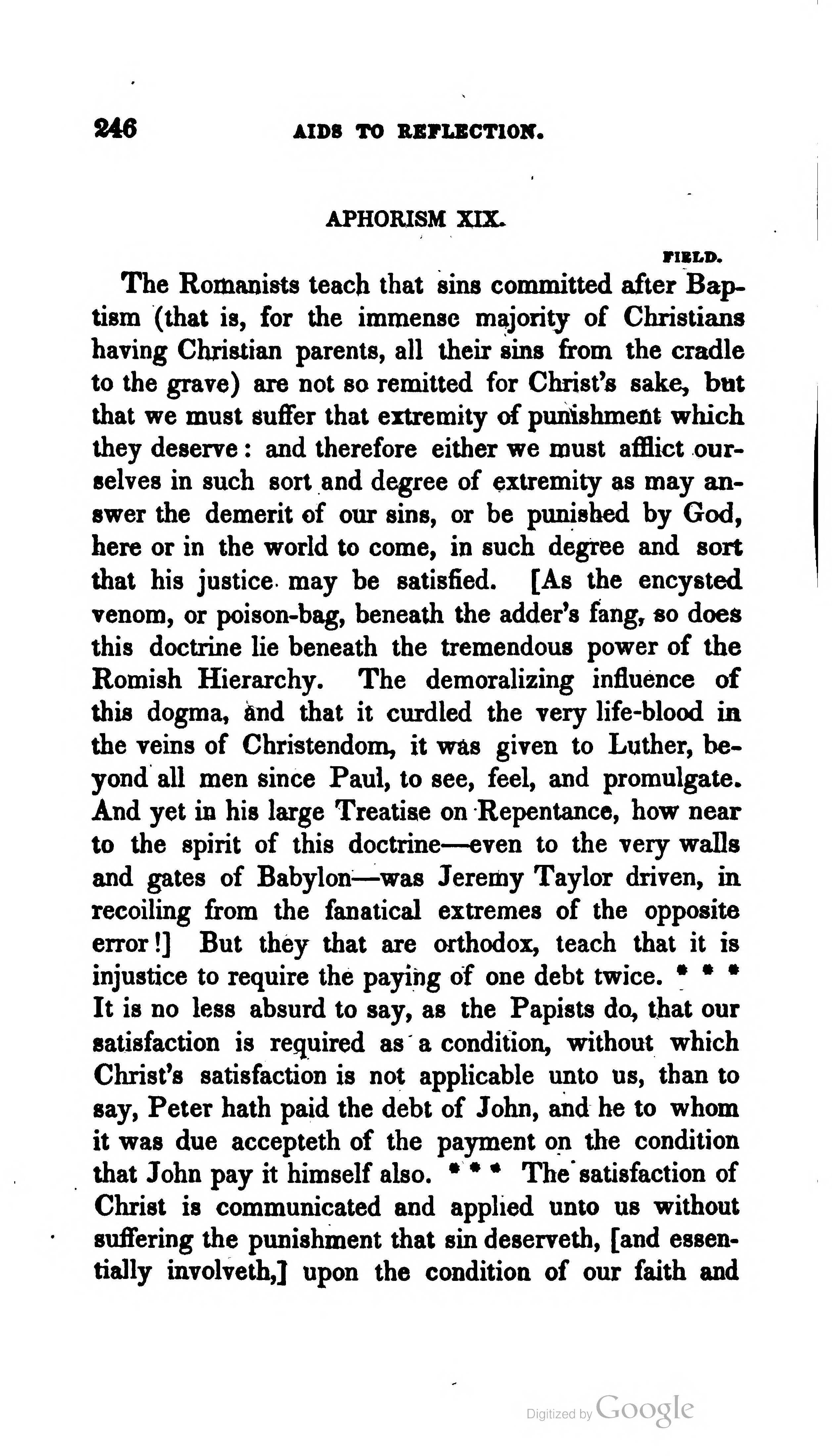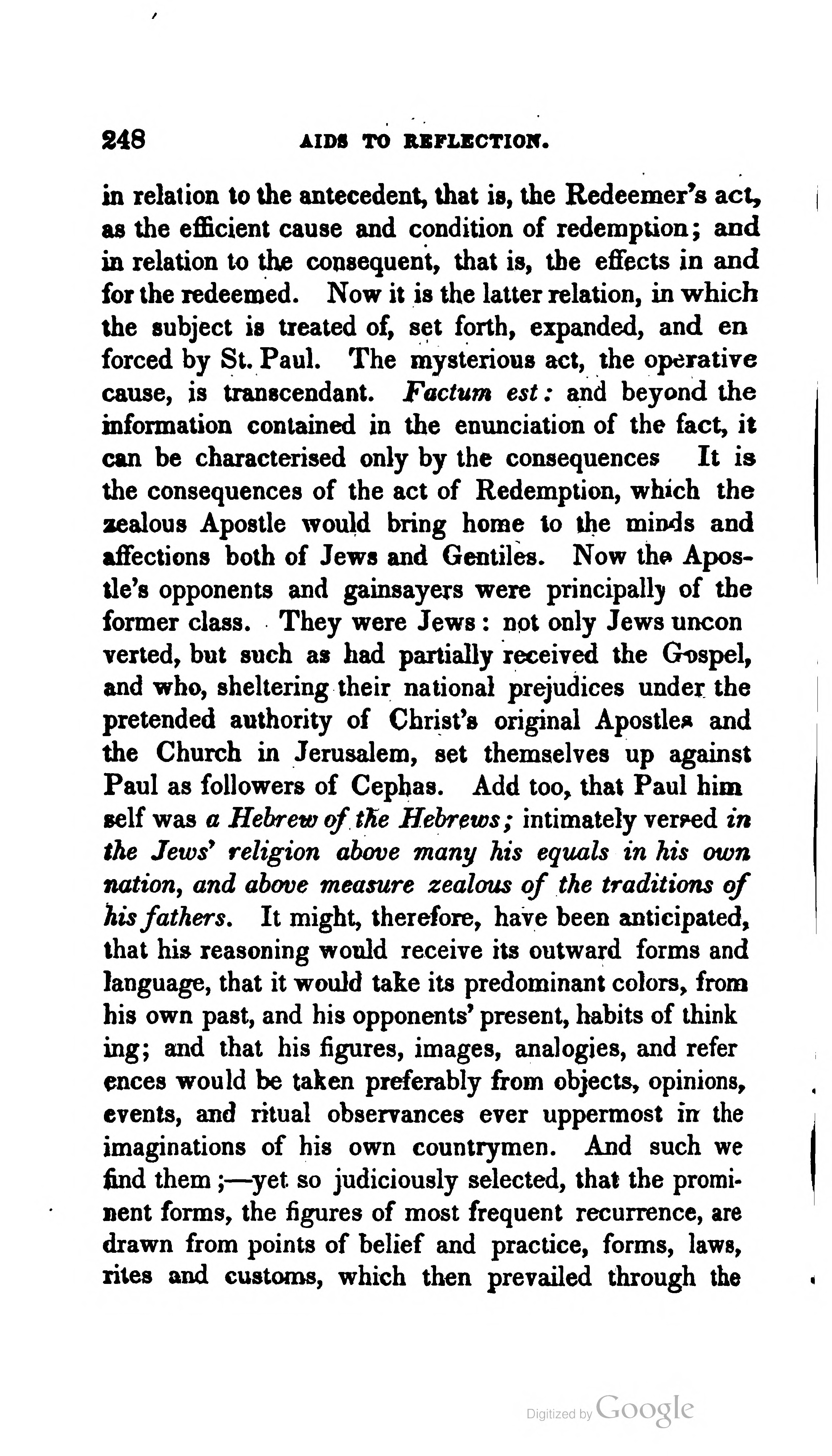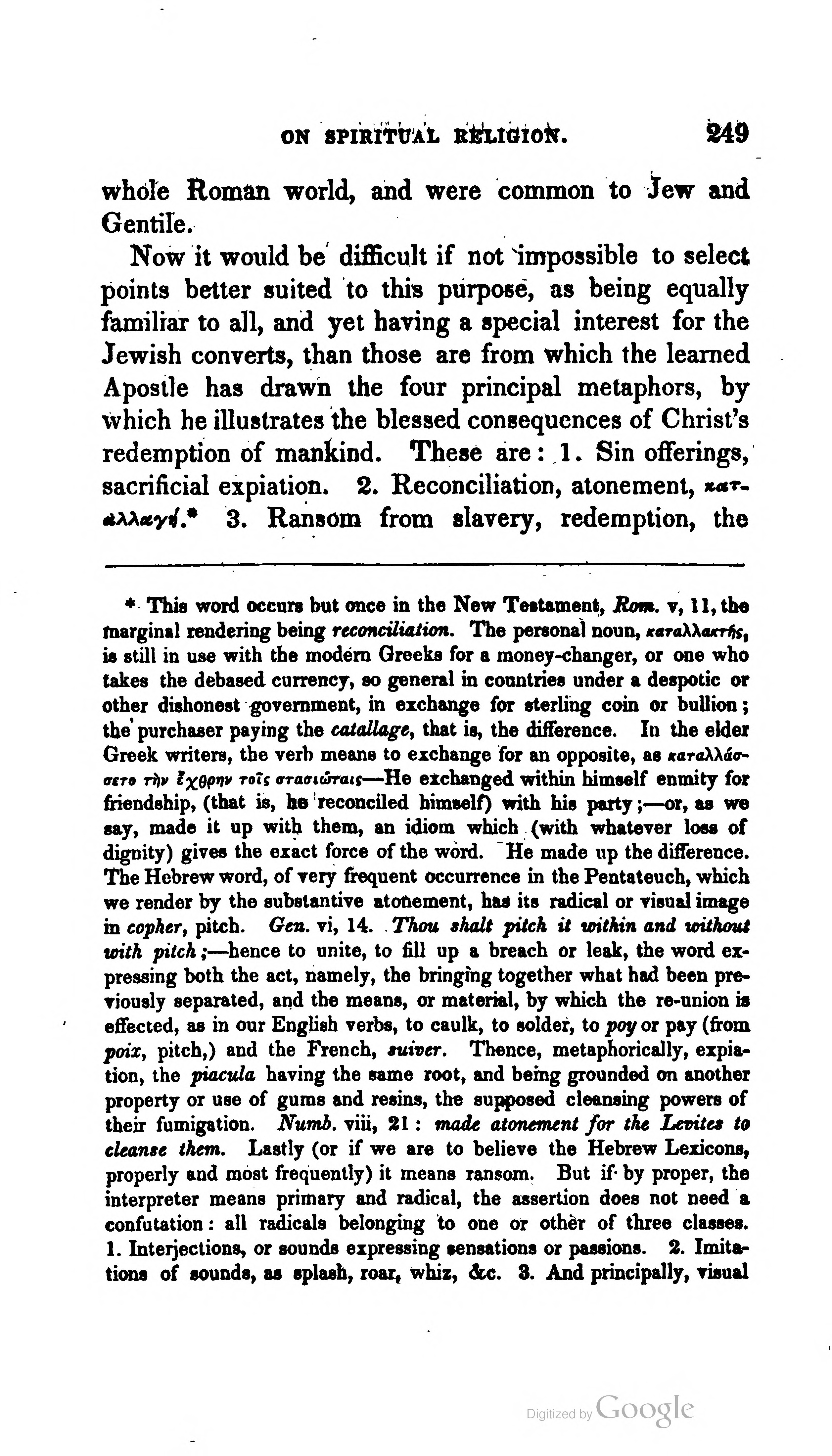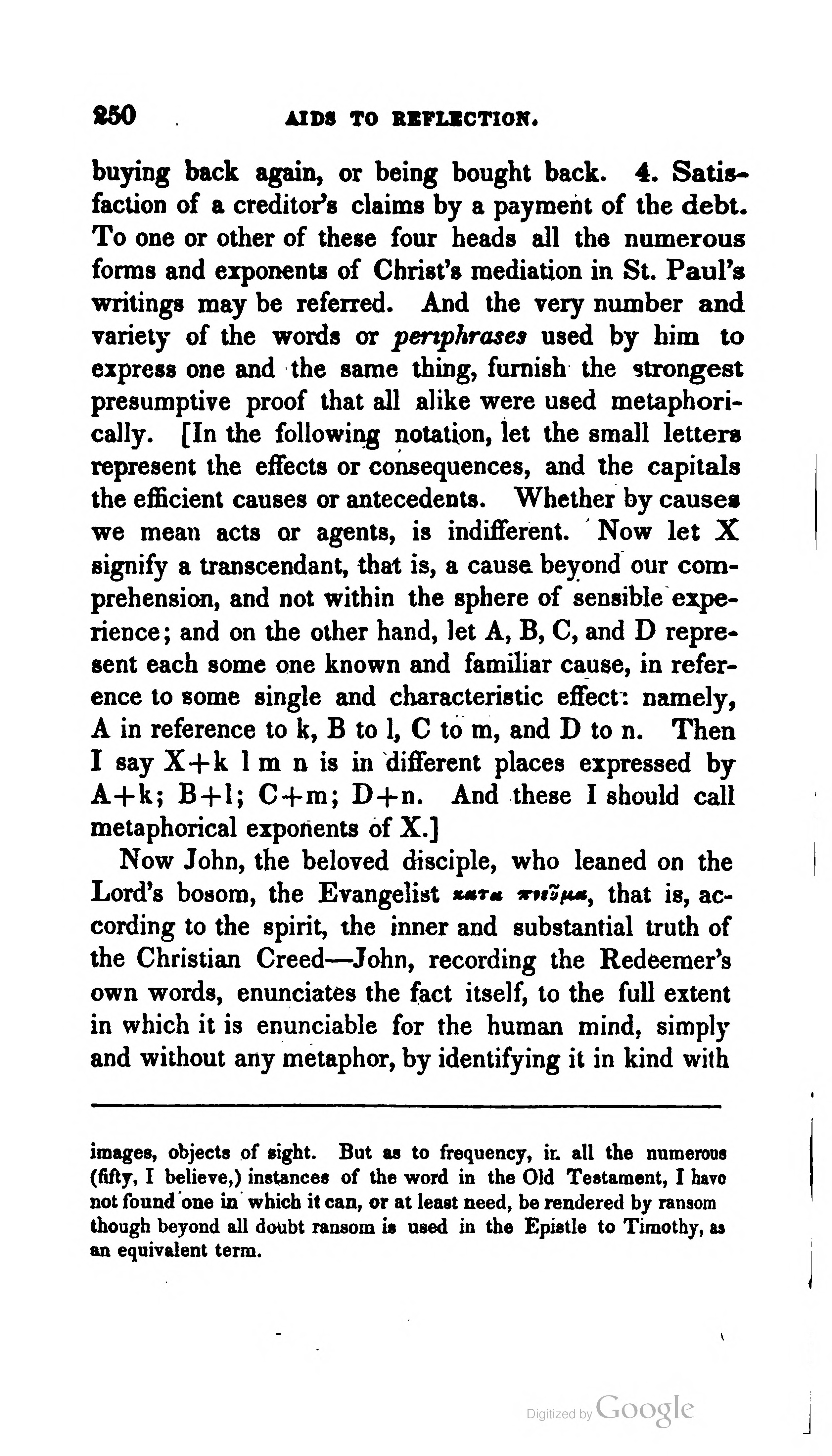Contents
| « Prev | COMMENT. | Next » |
COMMENT.
(CONTAINING AN APPLICATION OF THE PRINCIPLES LAID DOWN IN PAGES 152, 153).
Forgiveness of sin, the abolition of guilt, through the redemptive power of Christ's love, and of his perfect obedience during his voluntary assumption of humanity, is expressed, on account of the resemblance of the consequences in both cases, by the payment of a debt for another, which debt the payer had not himself incurred. Now the impropriation of this metaphor--(that is, the taking it literally)--by transferring the sameness from the consequents to the antecedents, or inferring the identity of the causes from a resemblance in the effects--this is the point on which I am at issue: and the view or scheme of redemption grounded on this confusion I believe to be altogether un-Scriptural.
Indeed, I know not in what other instance I could better exemplify the species of sophistry noticed in p. 166, as the Aristotelean

or clandestine passing over into a diverse kind. The purpose of a metaphor is to illustrate a something less known by a partial identification of it by some other thing better understood, or at least more familiar. Now the article of Redemption may be considered in a twofold relation-- 248 in relation to the antecedent, that is, the Redeemer's act, as the efficient cause and condition of redemption; and in relation to the consequent, that is, the effects in and for the redeemed. Now it is the latter relation, in which the subject is treated of, set forth, expanded, and enforced by St. Paul. The mysterious act, the operative cause, is transcendant. Factum est: and beyond the information contained in the enunciation of the fact, it can be characterised only by the consequences. It is the consequences of the act of Redemption, which the zealous Apostle would bring home to the minds and affections both of Jews and Gentiles. Now the Apostle's opponents and gainsayers were principally of the former class. They were Jews: not only Jews unconverted, but such as had partially received the Gospel, and who, sheltering their national prejudices under the pretended authority of Christ's original Apostles and the Church in Jerusalem, set themselves up against Paul as followers of Cephas. Add too, that Paul himself was a Hebrew of the Hebrews; intimately versed in the Jews' religion above many his equals in his own nation, and above measure zealous of the traditions of his fathers. It might, therefore, have been anticipated, that his reasoning would receive its outward forms and language, that it would take its predominant colors, from his own past, and his opponents' present, habits of thinking; and that his figures, images, analogies, and references would be taken preferably from objects, opinions, events, and ritual observances ever uppermost in the imaginations of his own countrymen. And such we find them;--yet so judiciously selected, that the prominent forms, the figures of most frequent recurrence, are drawn from points of belief and practice, forms, laws, rites and customs, which then prevailed through the 249 whole Roman world, and were common to Jew and Gentile.
Now it would be difficult if not impossible to select points better suited to this purpose, as being equally familiar to all, and yet having a special interest for the Jewish converts, than those are from which the learned Apostle has drawn the four principal metaphors, by which he illustrates the blessed consequences of Christ's redemption of mankind. These are: 1. Sin offerings, sacrificial expiation. 2. Reconciliation, atonement,


* This word occurs but once in the New Testament, Rom. v, 11, the marginal rendering being reconciliation. The personal noun,

is still in use with the modern Greeks for a money-changer, or one who takes the debased currency, so general in countries under a despotic or other dishonest government, in exchange for sterling coin or bullion; the purchaser paying the catallage, that is, the difference. In the elder Greek writers, the verb means to exchange for an opposite,


He exchanged within himself enmity for friendship, (that is, he reconciled himself with his party;— or, as we say, made it up with them, an idiom which (with whatever loss of dignity) gives the exact force of the word. He made up the difference. The Hebrew word, of very frequent occurrence in the Pentateuch, which we render by the substantive atonement, has its radical or visual image in copher, pitch. Gen. vi, 14. Thou shalt pitch it within and without with pitch;--hence to unite, to fill up a breach or leak, the word expressing both the act, namely, the bringing together what had been previously separated, and the means, or material, by which the re-union is effected, as in our English verbs, to caulk, to solder, to poy or pay (from poix, pitch,) and the French, suiver. Thence, metaphorically, expiation, the piacula having the same root, and being grounded on another property or use of gums and resins, the supposed cleansing powers of their fumigation. Numb. viii, 21: made atonment for the Levites to cleanse them. Lastly (or if we are to believe the Hebrew Lexicons, properly and most frequently) it means ransom. But if by proper, the interpreter means primary and radical, the assertion does not need a confutation: all radicals belonging to one or other of three classes. 1. Interjections, or sounds expressing sensations or passions. 2. Imitations of sounds, as splash, roar, whiz, &c. 3. And principally, visual 250 buying back again, or being bought back. 4. Satisfaction of a creditor's claims by a payment of the debt. To one or other of these four heads all the numerous forms and exponents of Christ's mediation in St. Paul's writings may be referred. And the very number and variety of the words or periphrases used by him to express one and the same thing, furnish the strongest presumptive proof that all alike were used metaphorically. [In the following notation, let the small letters represent the effects or consequences, and the capitals the efficient causes or antecedents. Whether by causes we mean acts or agents, is indifferent. Now let X signify a transcendant, that is, a cause beyond our comprehension, and not within the sphere of sensible experience; and on the other hand, let A, B, C, and D represent each some one known and familiar cause, in reference to some single and characteristic effect: namely, A in reference to k, B to l, C to m, and D to n. Then I say X + k l m n is in different places expressed by A+k; B+l; C+m; D+n. And these I should call metaphorical exponents of X].
Now John, the beloved disciple, who leaned on the Lord's bosom, the Evangelist

that is, according to the spirit, the inner and substantial truth of the Christian Creed--John, recording the Redeemer's own words, enunciates the fact itself, to the full extent in which it is enunciable for the human mind, simply and without any metaphor, by identifying it in kind with
images, objects of sight. But as to frequency, all the numerous (fifty, I believe,) instances of the word in the Old Testament, I have not found one in which it can, or at least need, be rendered by ransom though beyond all doubt ransom is used in the Epistle to Timothy, as an equivalent term. 251 a fact of hourly occurrence--expressing it, I say, by a familiar fact the same in kind with that intended, though of a far lower dignity;--by a fact of every man's experience, known to all, yet not better understood than the fact described by it. In the redeemed it is a regeneration, a birth, a spiritual seed impregnated and evolved, the germinal principle of a higher and enduring life, of a spiritual life--that is, a life the actuality of which is not dependent on the material body, or limited by the circumstances and processes indispensable to its organization and subsistence. Briefly, it is the differential of immortality, of which the assimilative power of faith and love is the integrant, and the life in Christ the integration.
But even this would be an imperfect statement, if we omitted the awful truth, that besides that dissolution of our earthly tabernacle which we call death, there is another death, not the mere negation of life, but its positive opposite. And as there is a mystery of life, and an assimilation to the principle of life, even to him who is the Life; so is there a mystery of death, and an assimilation to the principle of evil; a fructifying of the corrupt seed, of which death is the germination. Thus the regeneration to spiritual life is at the same time a redemption from the spiritual death.
Respecting the redemptive act itself, and the divine agent, we know from revelation that he was made a quickening

life-making) Spirit: and that in order to this it was necessary that God should be manifested in the flesh; that the Eternal Word, through whom and by whom the world

the order, beauty, and sustaining law of visible natures) was and is, should be made flesh, assume our humanity personally, fulfil all righteousness, and so suffer and so die for us, as in 252 dying to conquer death for as many as should receive him. More than this, the mode, the possibility, we are not competent to know. It is, as hath been already observed concerning the primal act of apostasy, a mystery by the necessity of the subject--a mystery, which at all events it will be time enough for us to seek and expect to understand, when we understand the mystery of our natural life, and its conjunction with mind and will and personal identity. Even the truths that are given to us to know, we can know only through faith in the spirit. They are spiritual things which must be spiritually discerned. Such, however, being the means and the effects of our redemption, well might the fervent Apostle associate it with whatever was eminently dear and precious to erring and afflicted mortals, and (where no expression could be commensurate, no single title be other than imperfect) seek from similitude of effect to describe the superlative boon, by successively transferring to it, as by a superior claim, the name of each several act and ordinance, habitually connected in the minds of all his hearers with feelings of joy, confidence, and gratitude.
Do you rejoice when the atonement made by the priest has removed the civil stain from your name, restored you to your privileges as a son of Abraham, and replaced you in the respect of your brethren?--Here is an atonement which takes away a deeper and worse stain, an eating canker-spot in the very heart of your personal being. This, to as many as receive it, gives the privilege to become sons of God (John i, 12); this will admit you to the society of angels, and insure to you the rights of brotherhood with spirits made perfect. (Heb. xii, 22). Here is a sacrifice, a sin-offering for the whole world: and a High Priest, who is indeed a Mediator; who, not 253 in type or shadow, but in very truth, and in his own right, stands in the place of Man to God, and of God to Man; and who receives as a Judge what he offered as an Advocate.
Would you be grateful to one who had ransomed you from slavery under a bitter foe, or who brought you out of captivity? Here is redemption from a far direr slavery, the slavery of sin unto death; and he who gave himself for the ransom, has taken captivity captive.
Had you by your own fault alienated yourself from your best, your only sure friend;--had you, like a prodigal, cast yourself out of your Father's house;--would you not love the good Samaritan, who should reconcile you to your friend? Would you not prize above all price the intercession, which had brought you back from husks, and the tending of swine, and restored you to your father's arms, and seated you at your father's table?
Had you involved yourself in a heavy debt for certain gewgaws, for high-seasoned meats, and intoxicating drinks, and glistening apparel, and in default of payment had made yourself over as a bondsman to a hard creditor, who, it was foreknown, would enforce the bond of judgment to the last tittle;--with what emotions would you not receive the glad tidings that a stranger, or a friend whom in the days of your wantonness you had neglected and reviled, had paid the debt for you, had made satisfaction to your creditor? But you have incurred a debt of death to the evil nature; you have sold yourself over to sin; and, relatively to you, and to all your means and resources, the seal on the bond is the seal of necessity. Its stamp is the nature of evil. But the stranger has appeared, the forgiving friend has come, even the Son of God from heaven: and to as 254 many as have faith in his name, I say--the debt is paid for you;--the satisfaction has been made.
Now, to simplify the argument, and at the same time to bring the question to the test, we will confine our attention to the figure last mentioned, namely, the satisfaction of a debt. Passing by our modern Alogi, who find nothing but metaphors in either Apostle, let us suppose for a moment, with certain divines, that our Lord's words, recorded by John, and which in all places repeat and assert the same analogy, are to be regarded as metaphorical; and that it is the varied expressions of St. Paul that are to be literally interpreted: for example, that sin is, or involves, an infinite debt, (in the proper and law-court sense of the word, debt)--a debt owing by us to the vindictive justice of God the Father, which can only be liquidated by the everlasting misery of Adam and all his posterity, or by a sum of suffering equal to this. Likewise, that God the Father, by his absolute decree, or (as some, divines teach) through the necessity of his unchangeable justice, had determined to exact the full sum; which must, therefore, be paid either by ourselves or by some other in our name and behalf. But besides the debt which all mankind contracted in and through Adam, as a homo publicus, even as a nation is bound by the acts of its head or its plenipotentiary, every man (say these divines) is an insolvent debtor on his own score. In this fearful predicament the Son of God took compassion on mankind, and resolved to pay the debt for us, and to satisfy the divine justice by a perfect equivalent. Accordingly, by a strange yet strict consequence, it has been holden by more than one of these divines, that the agonies suffered by Christ were equal in amount to the sum total of the torments of all mankind here and hereafter, or to the infinite debt, which 255 in an endless succession of instalments we should have been paying to the divine justice, had it not been paid in full by the Son of God incarnate!
It is easy to say--"O but I do not hold this, or we do not make this an article of our belief!" The true question is: "Do you take any part of it; and can you reject the rest without being inconsequent?" Are debt, satisfaction, payment in full, creditor's rights, and the like, nomina propria, by which the very nature of Redemption and its occasion is expressed;--or are they, with several others, figures of speech for the purpose of illustrating the nature and extent of the consequences and effects of the redemptive act, and to excite in the receivers a due sense of the magnitude and manifold operation of the boon, and of the love and gratitude due to the Redeemer? If still you reply, the former: then, as your whole theory is grounded on a notion of justice, I ask you--Is this justice a moral attribute? But morality commences with, and begins in, the sacred distinction between thing and person. On this distinction all law, human and divine, is grounded; consequently, the law of justice. If you attach any meaning to the term justice, as applied, to God, it must be the. same to which you refer when you affirm or deny it of any other personal agent--save only, that in its attribution to God, you speak of it as unmixed and perfect. For if not, what do you mean? And why do you call it by the same name? I may, therefore, with all right and reason, put the case as between man and man. For should it be found irreconcilable with the justice which the light of reason, made law in the conscience, dictates to man, how much more must it be incongruous with the all-perfect justice of God! Whatever case I should imagine would be felt by the reader as below the dignity of the 256 subject, and in some measure jarring with his feelings; and in other respects the more familiar the case, the better suited to the present purpose.
A sum of £1000 is owing from James to Peter, for which James has given a bond. He is insolvent, and the bond is on the point of being put in suit against him, to James' utter ruin. At this moment Matthew steps in, pays Peter the thousand pounds, and discharges the bond. In this case, no man would hesitate to admit, that a complete satisfaction had been made to Peter. Matthew's £1000 is a perfect equivalent for the sum which James was bound to have paid, and which Peter had lent. It is the same thing: and this is altogether a question of things. Now instead James' being indebted to Peter for a sum of money, which (he having become insolvent) Matthew pays for him, let me put the case, that James had been guilty of the basest and most hardhearted ingratitude to a most worthy and affectionate mother, who had not only performed all the duties and tender offices of a mother, but whose whole heart was bound up in this her only child--who had foregone all the pleasures and amusements of life in watching over his sickly childhood, had sacrificed her health and the far greater part of her resources to rescue him from the consequences of his follies and excesses during his youth and early manhood; and to procure for him the means of his present rank and affluence--all which he had repaid by neglect, desertion, and open profligacy. Here the mother, stands in the relation of the creditor: and here too, I will suppose the same generous friend to interfere, and to perform with the greatest tenderness and constancy all those duties of a grateful and affectionate son, which James ought to have performed. Will this satisfy the mother's claims 257 on James, or entitle him to her esteem, approbation, and blessing? Or what if Matthew, the vicarious son, should at length address her in words to this purpose: "Now, I trust, you are appeased, and will be henceforward reconciled to James, I have satisfied all your claims on him. I have paid his debt in full: and you are too just to require the same debt to be paid twice over. You will therefore regard him with the same complacency, and receive him into your presence, with the same love, as if there had been no difference between him and you. For I have made it up." What other reply could the swelling heart of the mother dictate than this: "O misery! and is it possible that you are in league with my unnatural child to insult me? Must not the very necessity of your abandonment of your proper sphere, form an additional evidence of his guilt? Must not the sense of your goodness teach me more fully to comprehend, more vividly to feel, the evil in him? Must not the contrast of your merits magnify his demerit in his mother's eye, and at once recall and embitter the conviction of the canker worm in his soul?"
If indeed by the force of Matthew's example, by persuasion, or by additional and more mysterious influences, or by an inward co-agency, compatible with the existence of a personal will, James should be led to repent; if through admiration and love of this great goodness gradually assimilating his mind to the mind of his benefactor, he should in his own person become a grateful and dutiful child--then doubtless the mother would be wholly satisfied! But then the case is no longer a question of things, or a matter of debt payable by another. Nevertheless, the effect,--and the reader will remember, that it is the effects and consequences of Christ's mediation, on which St. Paul is dilating--the effect to 258 James is similar in both cases, that is, in the case of James, the debtor, and of James, the undutiful son. In both cases, James is liberated from a grievous burthen: and in both cases, he has to attribute his liberation to the act and free grace of another. The only difference is, that in the former case (namely, the payment of the debt) the beneficial act is, singly and without requiring any re-action or co-agency on the part of James, the efficient cause of his liberation; while in the latter case (namely, that of Redemption) the beneficial act is the first, the indispensable condition, and then, the co-efficient.
The professional student of theology will, perhaps, understand the different positions asserted in the preceding argument more readily if they are presented synoptically, that is, brought at once within his view, in the form of answers to four questions, comprising the constituent parts of the Scriptural doctrine of Redemption. And I trust that my lay readers of both sexes will not allow themselves to be scared from the perusal of the following short catechism, by half a dozen Latin words, or rather words with Latin endings, that translate themselves into English, when I dare assure them, that they will encounter no other obstacle to their full and easy comprehension of the contents.
Synopsis of the constituent points in the doctrine of Redemption, in four questions, with correspondent answers.
Questions.
Who (or What) is the
-
Agens causator?
-
Actus causativus?
-
Effectum causatum?
-
Consequentia ab effecto?
| « Prev | COMMENT. | Next » |